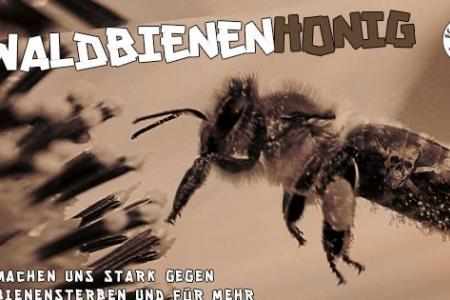5 silly ways football clubs can go green as German club rolls in the honey
A German club is doing their bit to help the environment - by rearing their very own bee colonies.
St Pauli, which ply their trade in the Bundesliga 2, have set up a pair of beehives on their home ground - the Millerntor-Stadion in Hamburg.
As a result, St Pauli are the first club in Germany to produce their own honey called Ewaldbienenhonig - a play on manager Ewald Lienen's name and the German word for bee, bienen.
Whoever said Germans don't have a sense of humour?
The club are hoping their actions will raise awareness for the problems bees are facing with declining populations by encouraging people who live within a 3km radius of the stadium to do their part by making "bee friendly" window boxes.
While somewhat unusual, St Pauli's initiative is certainly commendable considering how bees play an important role in the ecosystem by acting as pollinating agents for plants to help them reproduce.
With that in mind, here are several ideas we've come up with to help football clubs that are thinking of going green - with tongue partly in cheek, of course.
1) PLANT A TREE FOR EVERY GOAL PLEDGE

ST FILE PHOTO
Nothing creates more buzz in a football stadium (or the living room where the main television is at) than a goal.
So why not give the environment a reason to cheer as well by pledging to plant a tree somewhere whenever a goal is scored?
Such a move would be a no-brainer for clubs like Manchester City and Barcelona which have so many goals in them, they could probably re-populate the Amazon by 2050.
For clubs who don't quite have goal machines like Lionel Messi or Cristiano Ronaldo, they could do the same thing but going by the number of goals they concede instead.
Under such conditions, Championship-bound Aston Villa would definitely have a major impact on the environment, considering they've already shipped in 64 goals so far.
2) BUILD A GREEN STADIUM... LITERALLY

PHOTO: TWITTER / @FGRFC_OFFICIAL
The green stadium isn't a new concept - English Conference side Forest Green Rovers power their stadium The New Lawn with solar panels and play on an organic pitch that is cared for without artificial chemicals.
It's a fantastic vision, but let's take it to the next level - by GROWING a living, breathing stadium out of trees and shrubs.
It's certainly not inconceivable. A New Zealand man built a stunningly beautiful church that was made completely out of trees in around four years.
A big stadium would obviously take a wee bit longer to cultivate, but this definitely is an option for any football club that's serious about leaving a legacy for their children's children (and their children's children).
Just be careful of forest fires, termites, herbivores and lumberjacks.
3) ADOPT REAL ANIMALS THAT SYMBOLISE YOUR CLUB

PHOTO: S.LEAGUE
People love adopting mascots for the values they represent and football clubs are no different.
Animals are a popular choice - just look at our very own S.League that is populated with White Swans, Stags, Cheetahs and Eagles.
Clubs could work with zoos and animal conservation groups to adopt endangered species of these animals.
For starters, Chelsea could adopt a lion (or based on their current form, a donkey sanctuary). And while the Red Devils don't have a traditional animal associated with them, Manchester United could adopt Tasmanian devils.
It would certainly be great if Arsenal could make their fictional Gunnersaurus a reality by funding research to resurrect dinosaurs and create a theme park on a remote isla... Never mind, scratch that thought.
4) RECYCLE, RECYCLE, RECYCLE

TNP FILE PHOTO
The world is facing a plastic crisis - we're generating so much of it, entire islands have been created in the oceans thanks to our trash.
Fortunately, football has been making some headway in helping reduce our plastic waste.
Sportswear makers like Nike have been synthesising polyester for their football kits from used plastic drinking bottles while turf makers like Desso use recycled materials to create hybrid playing surfaces.
And even though clubs have various recycling programmes already in place, there's always room to do more.
For example, certain clubs could smelt their legions of plastic fans and turn them into jerseys for the less fortunate.
And in a similar vein, Leicester City could start a campaign to get glory hunting fans to trade in their old Manchester United/Chelsea/Manchester City/Arsenal/Blackburn Rovers shirts - once the Foxes inevitably win the Premier League title in May, of course.
5) CUT DOWN TRANSPORT EMISSIONS

PHOTO: AFP
Whether by plane or by bus, a football team travelling for away games means one thing: greenhouse gases.
So here's our radical solution - make the players and staff get on their bikes and cycle to their away games.
It's truly a win-win situation - the club creates fewer emissions, the players can improve their fitness and less fossil fuels are guzzled up.
And if any club likes this idea and wants to go a step further, they can ban their players from driving to training.
While luxury car makers might be in for a rough spell, they could take a cue from Lamborghini.
For its 50th anniversary in 2013, the Italian supercar maker teamed up with BMC to release a limited edition road bike that cost a cool US$32,000 (S$43,000) a pop.
Even though only 50 pieces were made, a steady stream of footballer clients with more money than sense might convince Lamborghini that there might be a future in bicycle manufacturing.
Source: BBC
Get The New Paper on your phone with the free TNP app. Download from the Apple App Store or Google Play Store now



